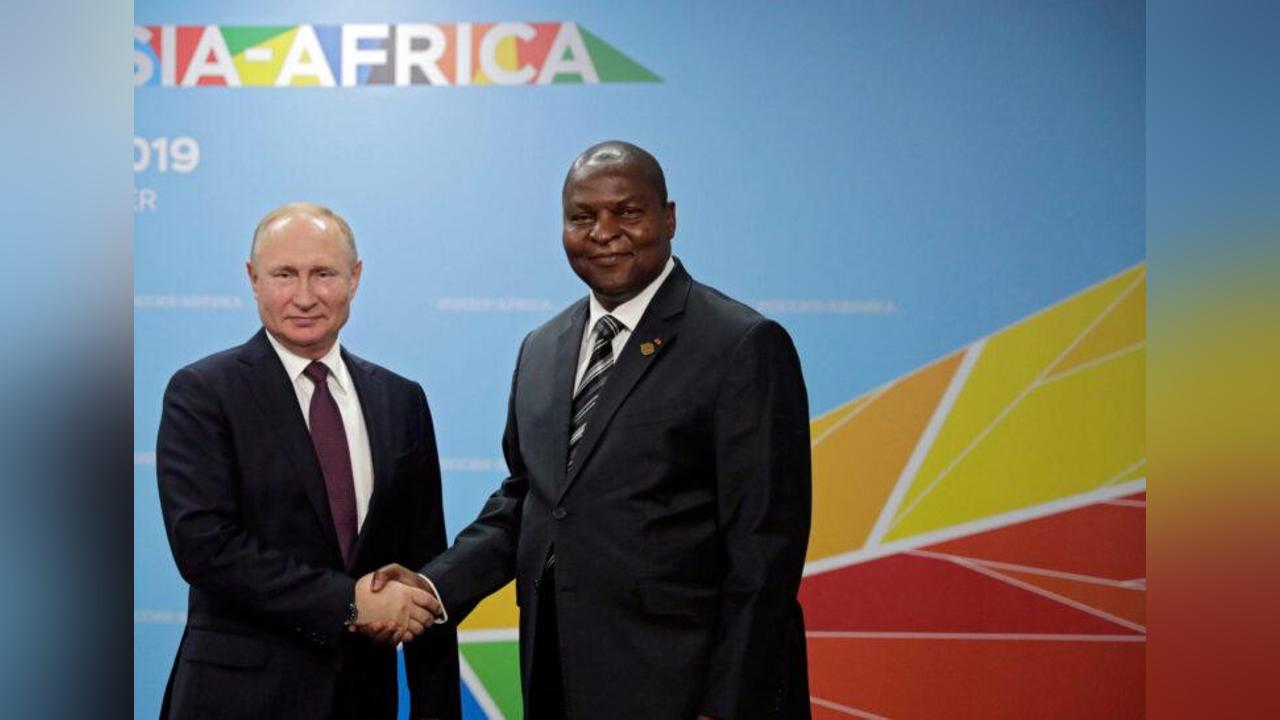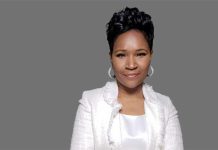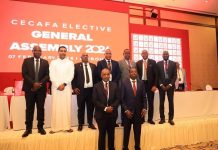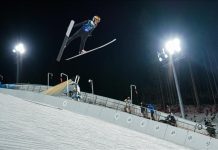Africa-Press – Lesotho. Wagner, the unofficial private security company linked to Russia’s President Vladimir Putin, is becoming increasingly active in the continent.
Its story involves secret dealings, cash and local intelligence networks, is worthy of a spy novel. In the first of our two-part investigation, we delve into its tightly woven network. The atmosphere was festive once again at La Brasserie Kiss.
On the evening of 20 April, about 100m from the ‘zero kilometre point’ in the heart of Bangui, a few vehicles were still parked in front of the three-storey cabaret, one of the city’s best establishments.
The lights from the building illuminated the night. Outside, Avenue du Colonel Conus was deserted. It was nearly 8pm, which meant that the curfew would soon come into force.
But a few customers, regulars, had no intention of leaving. Colonel Vassili often paid little attention to the traffic ban. At the wheel of his armoured pick-up, this Russian officer with a youthful face and blonde hair felt at home in the capital.
He had been invited to the brasserie that night and was determined to enjoy himself. Good-natured and well-built, this lover of alcoholic pleasures had dressed himself in civilian clothes for the occasion.
Chad: The last hours of President Idriss Déby”] With a glass of wine in hand, he toasted several times to the memory of Idriss Déby Itno, who had died two days earlier and whose death he seemed to be happy about.
But some revelers grimaced. Even though the marshal had not been among their favourites, it seemed somewhat disrespectful to celebrate his death. Despite the fact that the colonel was living in the moment and enjoying the company of his two guests, he was still on duty, and his phone reminded him of this, twice.
The first person who contacted him that night was CAR President Faustin-Archange Touadéra: he was looking for information. Touadéra wanted to know how much progress the Russian auxiliary troops had made with regards to the Coalition des Patriotes pour le Changement (CPC), an alliance of armed groups coordinated by François Bozizé.
Vassili, whose full name is not widely known, was the right man for the job, as he is one of the leaders of the mercenaries affiliated to the security company Wagner, of which he is a member of staff.
The colonel, who was used to talking to the president, quickly reassured him that his men had the upper hand. The CAR army, which was leaving the frontline to its Russian allies, would soon be able to advance and officially occupy the conquered positions.
Vassili then hung up and returned to drinking his glass of wine. The festivities continued, past curfew. Vassili had so much influence that the cabaret was allowed to break the rules.
That is the kind of privilege that comes with power. But who is this man who is a stranger to almost all the people in Bangui? “He has direct and regular contact with the president and is a high-ranking member of Wagner’s staff within the CAR,” says one of our sources.
So is he the ‘boss’ of Wagner’s branch in the CAR? Officially, the private military company – whose status is illegal in Russia – does not operate in the CAR, so there is no way to confirm Vassili’s identity.
However, in reality, the Wagner Group started conquering Bangui three years ago. And the reason why the company is so powerful today is because it has placed its men within all circles of power.
How did Wagner become omnipresent? In September 2017, France said it would deliver 1,500 Kalashnikovs – that its navy had confiscated off the coast of Somalia one and a half years earlier – to the Central African Armed Forces.
However, as the CAR was under a UN arms embargo, this decision had to be approved by the UN Security Council. Moscow, which had veto power, opposed the project.
To break the deadlock, Paris discreetly advised Touadéra to plead his case with the Russian giant. In October, the Central African president met with foreign affairs minister Sergey Lavrov in Sochi.
The Kremlin then agreed to lift its veto and took advantage of this opportunity to bring up the thorny Central African issue. Lavrov proposed an agreement that involved more than just a ‘simple’ lifting of the veto.
Russia agreed to put all its weight behind lifting the embargo, which Bangui had long hoped would be eased. In exchange, Russia expected a return on investment.
One of the agreement’s clauses, which was not made public at the time, was that either a Russian mining company be created in the CAR or that Russians be allowed to operate an airfield in the Ouadda region.
In January 2018, an Ilyushin 76 cargo plane made its first arms delivery. This was followed by 6,200 Kalashnikovs, 900 Makarov automatic pistols, 270 rocket launchers and 20 anti-aircraft guns, which were delivered in less than two months.
Above all, the first Russian ‘advisors’ landed on Central African soil and at least two companies obtained their first contracts. These were Lobaye Invest, which was created in October 2017, and its subsidiary Sewa Security Services, responsible for ensuring its security.
In June and July 2018, Léopold Mboli Fatran, the minister of mines, granted Lobaye Invest mining exploration permits in the regions of Yawa and Pama. Other permits were granted afterwards for the regions of N’Délé, Bria, Birao and Alindao.
What is the connection between Lobaye Invest and the Wagner group? Yevgeny Khodotov, the company’s managing director – who is discrete and does not appear in the news very often in Bangui – quickly attracts attention.
Born in 1964, the former St Petersburg police officer works in the shadows in close collaboration with his compatriot Valery Zakharov, a former Russian military intelligence officer (GRU) who has been advising President Touadéra since June 2018.
Khodotov also heads the company M-Finans, which operates on behalf of Concord, a Russian company considered to be a hub for the activities of Yevgeny Prigozhin, a well-known oligarch.
Putin, who knows Prigozhin well, promoted his rise within the country’s restaurant sector in the 1990s by making him the Kremlin and defence sector’s supplier.
This former fast-food boss, who made his fortune from selling hot dogs after the fall of the USSR, was convicted of fraud and incitement to prostitution in 1981 but released nine years later. Putin’s chef is also said to have obtained lucrative contracts – worth billions of dollars – from the Russian ministry of defence.
As such, Prigozhin is considered the main financier of Wagner, a group which was created in 2013 and 2014 and is often attributed to Dmitri Outkin – his relative who was a neo-Nazi sympathiser as well as a former lieutenant colonel of both the special forces and the GRU.
“As early as 2018, we saw the ‘advisors’ and companies controlled by Prigozhin arrive,” says a Bangui-based diplomat. In France, at the Quai d’Orsay, several memos were written about the rise of Russian influence.
There was a lot of worry after it was discovered that Zakharov was summoning ministers and presenting himself as the main advisor to the president, who had surrounded himself with guards recruited by Sewa Security Services.
But the Paris hierarchy, confident about its historical relationship with the CAR, chose to downplay the situation. Meanwhile, Prigozhin’s men, many of whom were close to him and advised by the GRU (Wagner’s first training camp in Russia that was located near Krasnodar and was a GRU base), played their part to perfection.
Zakharov and his men, who exploited anti-French sentiment and actively supported propaganda hostile to Paris, positioned themselves with the sole objective of obtaining financial spin-offs for companies linked to Wagner.
“They had conquered Bangui.
But they still didn’t know how they would use their influence over Touadéra and, above all, profit from the Central African subsoil, at a time when the country was still being mainly controlled by armed groups,” says a diplomatic source.
They quickly found a solution: to exert their influence on Sudan, one of the CAR’s neighbours. In Khartoum, Russia and Wagner’s influence steadily grew during the last few years of Omar al-Bashir’s rule.
This was met with great hostility from the US, which had supported the southern Sudanese neighbour since its independence. As a result, Wagner and Prigozhin decided to use the Sudanese bridgehead to move into the CAR.
A summit meeting, at the helm of which was Jamal Aldin Omar, took place in August 2018 in the directorate of military intelligence building. For several months, Omar’s men had been in contact with leaders of the Central African armed group, including Noureddine Adam and Ali Darassa.
Discrete helicopter trips were made between the Sudanese capital and the Central African bush. Omar explained to those in attendance that Khartoum was ready to host a dialogue between the Bangui government and the rebels fighting Touadéra. Most importantly, he said Morocco – which was considered a strong ally – was supporting him. Since 2013, Russia has undeniably supported Khartoum.
Mercenaries were quickly spotted, especially during moments when demonstrators were being repressed, and up to 300 men were employed by a company called M-Finance, which entered into a contract with the Russian authorities to use military aircraft and bring them to Sudan.
Wagner is behind these mercenaries and operates through three companies: M-Finance, M-Invest and Meroe Gold, the latter of which holds several mining concessions in the country.
M-Invest, as is the case with M-Finans in the CAR, is connected to Concord, via Megalite, another company in Prigozhin’s network. “The systems are the same in the CAR and Sudan, as local companies are linked to other companies connected to Concord and Prigozhin,” says a security source.
Since Khodotov was considered to be Wagner’s man in Bangui, then it was another man that was acting underhandedly in Khartoum, at the head of M-Invest and Meroe Gold. That man was Mikhaïl Potepkin. The local right-hand man of the St.
Petersburg oligarch has in the past been linked to propaganda operations sanctioned by the US authorities, and one of his alleged accomplices, Anna Bogacheva, is still wanted by the FBI.
Potepkin is also a former employee of the Internet Research Agency and was a member of the Foundation for the Protection of National Values, both of which are linked to Prigozhin.
In August 2018, at the top-secret Sudanese military intelligence headquarters, Potepkin was present. But he was not alone in the air-conditioned meeting room that Omar had provided, as Prigozhin was also there, surrounded by 15 or so uniformed bodyguards.
In fact, 60-year-old Prigozhin knows Khartoum quite well, as he regularly travels there by private jet, accompanied by two other aircraft: one for his men and the other for his luggage.
On the fateful day, his right-hand man Outkin was at his side, as was Zakharov – the man from Bangui – who was himself accompanied by the young Dmitry Sytyi, who works both as an interpreter and leads the propaganda operations on Central African soil.
Also present were most of the leaders of the CAR’s armed groups, who responded to Khartoum’s invitation that was sent on behalf of Wagner’s men. Darassa was present, as were Abdoulaye Hissène, Mahamat al-Khatim, Adam and Maxime Mokom.
According to several sources, they all received the equivalent of several tens of thousands of euros in cash. Though seated for two hours in comfortable armchairs around the large meeting table, the ‘rebels’ did not speak much.
Prigozhin, whose men had prepared for the summit with Sudanese intelligence, monopolised the floor. “The government brought us to Bangui to fight you,” he said at the outset.
Then the oligarch got to the heart of the matter: “But we know it will be difficult. We have to find a solution. ” “Prigozhin introduced his men and then pleaded for an agreement to be reached between the groups and the Central African government,” a participant told us.
“Then he explained his idea of a win-win partnership. He wanted to sponsor agreements and share resources, prefecture by prefecture.
A share for Bangui, a share for the group that controls the region and a final share for Wagner,” our source said. A round table discussion was then held, during which everyone voted in favour of holding a dialogue in Khartoum.
The participants remained cautious but agreed to meet again a month later, at the end of September, at the same premises. “The second meeting endorsed the dialogue in Khartoum. Everyone clarified what they wanted from it and then we parted ways,” said our participant.
On 5 February 2019, Prigozhin gathered the protagonists for the last time at his hotel in the Sudanese capital, as he was determined to obtain a peace agreement and succeed where the UN had so far failed.
In addition to the leaders of the armed groups, Firmin Ngrébada (CAR’s prime minister) and Marie-Noëlle Koyara (the defence minister) were on board.
After final negotiations, the so-called ‘Khartoum agreement’ was signed that same day, under the auspices of the African Union (AU) and its commissioner for peace and security, Smaïl Chergui. It was then signed by President Touadéra at the Palais de la Renaissance in Bangui the next day.
For More News And Analysis About Lesotho Follow Africa-Press






